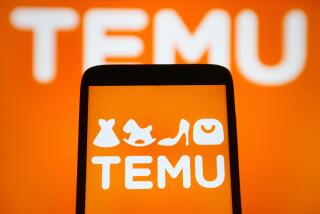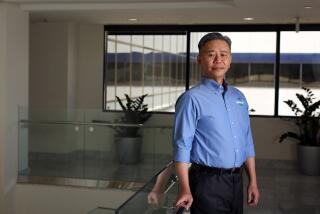Activist Links Kmart Goods to Chinese Army
- Share via
WASHINGTON — Harry Wu, the Chinese human rights activist, said Tuesday that he has uncovered shipping records showing that Kmart Corp., despite its denials, recently bought goods for its U.S. stores from a company owned by the People’s Liberation Army in China.
Wu, who timed his disclosures to coincide with Kmart’s annual stockholders meeting in Detroit, distributed documents to the news media that indicate that the giant retailer had purchased 145,824 pounds of men’s rainwear and ponchos last fall from PLA-owned China Tiancheng Corp.
“This is not some joint venture. This is not some capitalist enterprise. There are people who force others to support the Chinese Communist Party, and these are the same people who run the military secret police in China,” Wu said in a statement. “This company is owned by the political commissar section of the People’s Liberation Army.”
Kmart spokeswoman Mary Lorencz said Wu’s allegations were “new information” that the company would investigate. She said the company could not respond to specifics except to “reiterate that Kmart has a long-standing policy regarding human rights in the production of products sold in Kmart stores.”
The policy bars the use of children, forced prison labor and indentured soldiers in the products’ manufacture, she said.
In the past, Kmart executives have denied allegations such as Wu’s. In a May 1994 letter written by Kmart Vice President Peter Palmer to AFL-CIO officials, the company declared, “We have never had any dealings with the People’s Liberation Army, nor do we intend to ever have any dealings with them.”
Wu’s remarks Tuesday also appeared to be directed at President Clinton, who asked Congress a day earlier to renew most-favored-nation trade preferences for China without regard to that country’s human rights record.
Wu, who came to the United States in 1985 after surviving 19 years in a Chinese prison, is one of many human rights activists who have vowed to lobby strenuously against unconditional renewal of the trade preferences. Most-favored-nation status means China would continue to enjoy the same trade status as most other countries.
In his statement, Wu requested a meeting with Kmart executives and called on the Troy, Mich.-based company to immediately stop buying goods from companies owned by the PLA. He also demanded that the unsold Chinese rainwear be pulled from Kmart’s shelves and that the company issue a public apology for violating the policy that Palmer outlined in his 1994 letter.
The records distributed by Wu show that the shipments in question took place in August, September and October. Tiancheng Corp. has been identified by the U.S. Defense Intelligence Agency as a subsidiary of the PLA’s General Political Department.
Kmart is one of many American retailers that have been accused of importing goods manufactured either by forced labor or by companies owned by the PLA. These charges are at the heart of an effort by human rights, labor and religious rights groups to require the Chinese to improve their labor policies in exchange for renewal of most-favored-nation status.
Times wire services contributed to this report.
More to Read
Inside the business of entertainment
The Wide Shot brings you news, analysis and insights on everything from streaming wars to production — and what it all means for the future.
You may occasionally receive promotional content from the Los Angeles Times.










